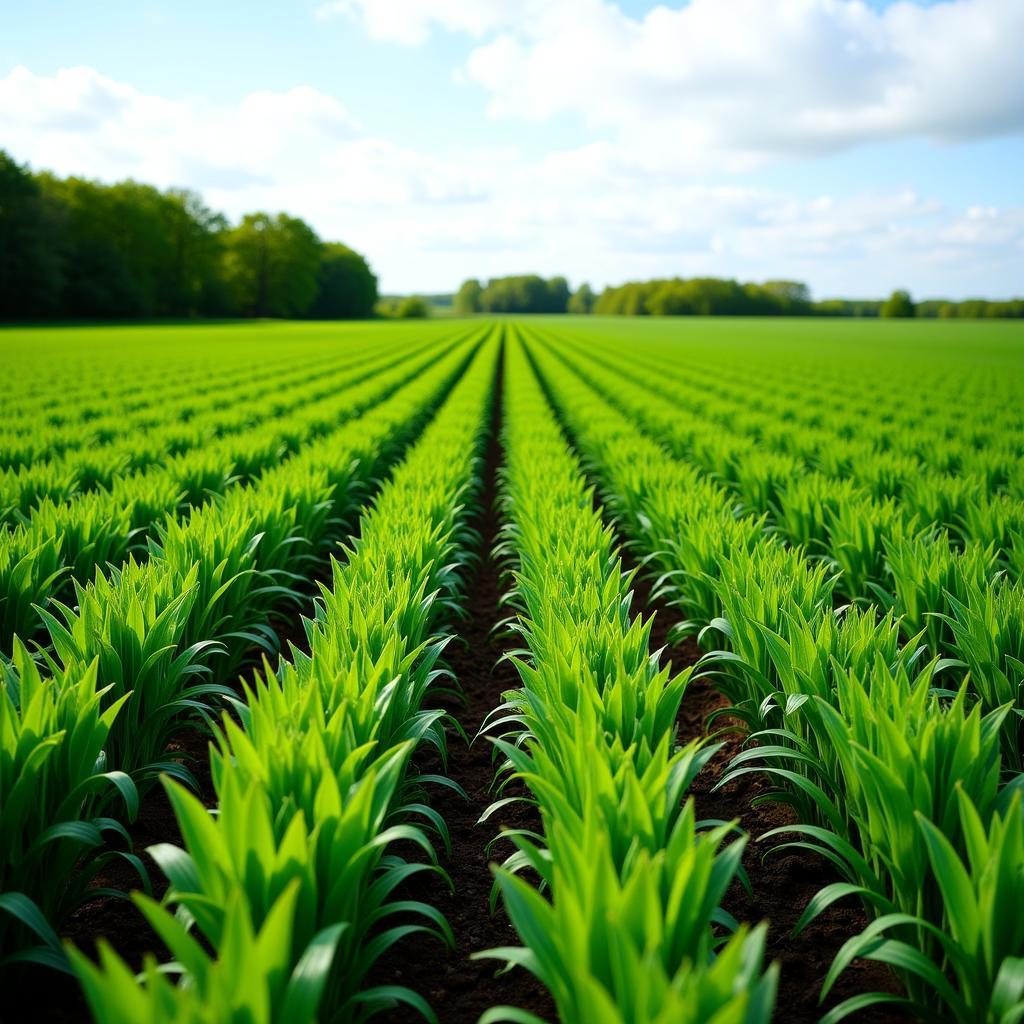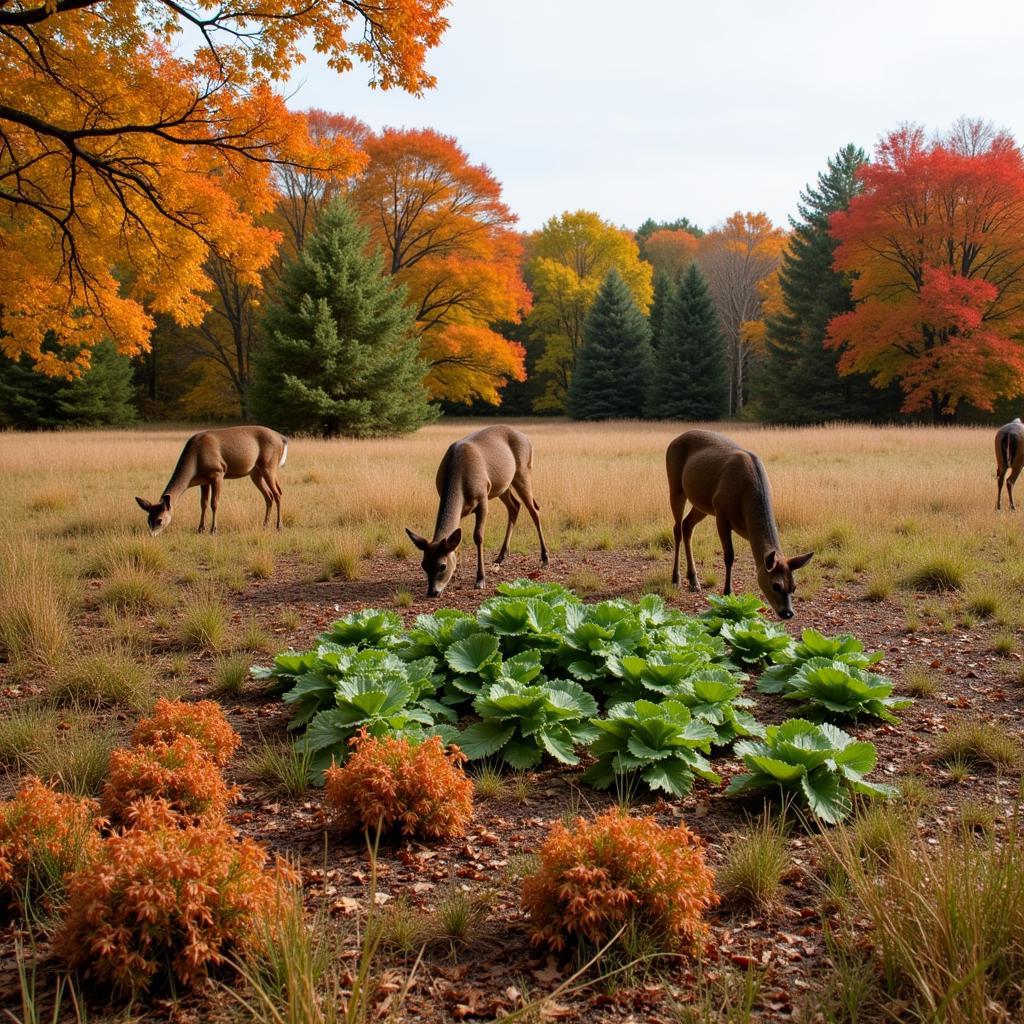Planning a food plot in Michigan? You’ve come to the right place. Choosing the optimal Michigan Food Plot Planting Dates is crucial for attracting deer and ensuring a flourishing plot. This guide will equip you with the knowledge to make informed decisions for a thriving food plot that will keep those whitetails coming back for more.
Understanding Michigan’s Climate and Its Impact on Planting Dates
Michigan’s climate plays a vital role in determining the best time to plant your food plot. The state’s diverse landscape, ranging from the Upper Peninsula to the southern Lower Peninsula, experiences a wide range of temperatures and frost dates. Understanding your specific region’s climate is key to maximizing your food plot’s success.
- Southern Lower Peninsula: This region enjoys a longer growing season, with warmer temperatures and later frost dates.
- Northern Lower Peninsula and Upper Peninsula: These areas experience shorter growing seasons, cooler temperatures, and earlier frost dates.
Always refer to the USDA Plant Hardiness Zone Map to determine the first and last frost dates for your specific location. This information is crucial in selecting appropriate plant varieties and timing your planting for optimal growth.
Spring Planting: Early Establishment for Maximum Growth
Spring planting in Michigan offers the advantage of a longer growing season, allowing plants to establish themselves before the heat of summer arrives. Here’s a breakdown of spring planting dates for popular food plot choices:
Early Spring (April – Early May):
- Oats: These cool-season grains provide excellent early-season forage.
- Spring Peas: A high-protein option that complements oats well.
- Brassicas (Turnips, Radishes): Plant these later in spring for a fall and winter food source.
Late Spring (Mid-May – June):
- Soybeans: A warm-season legume that provides high protein throughout summer and fall.
- Corn: A highly attractive food source for deer, but requires careful consideration for deer pressure.
- Sorghum: A drought-tolerant option for areas with less rainfall.
 Michigan Spring Food Plot
Michigan Spring Food Plot
Fall Planting: Attracting Deer During Hunting Season
Fall planting is strategic for attracting deer during the hunting season. By providing a fresh food source when natural forage dwindles, you can increase your chances of success.
Early Fall (August – September):
- Winter Rye: A cold-hardy cereal grain that establishes quickly and provides forage throughout winter.
- Winter Wheat: Similar to winter rye, offering excellent winter hardiness.
- Brassicas: If planted in late summer, brassicas will be ready for fall browsing.
Late Fall (October – November):
- Cereal Grains: Consider overseeding existing food plots with cereal grains for additional forage.
 Michigan Fall Food Plot
Michigan Fall Food Plot
Best Year-Round Deer Food Plot: Extending the Attraction
For optimal deer attraction throughout the year, consider establishing a best year round deer food plot. This involves a strategic combination of plantings that cater to deer’s nutritional needs throughout different seasons.
Factors Influencing Planting Dates
While these general guidelines provide a starting point, several factors can influence the ideal planting dates for your specific food plot:
- Soil Temperature: Different seeds require specific soil temperatures for optimal germination. Use a soil thermometer to ensure the ground is warm enough.
- Rainfall: Adequate moisture is essential for seed germination and growth. Pay attention to rainfall patterns and consider irrigation if necessary.
- Deer Pressure: High deer pressure might require adjusting planting dates or using strategies to protect young plants.
Tips for Successful Food Plot Planting in Michigan
- Soil Testing: Before planting, get a soil test to determine nutrient levels and pH. This will help you amend the soil accordingly.
- Weed Control: Implement effective weed control measures before and after planting to minimize competition.
- Fertilization: Follow recommended fertilization guidelines based on your soil test results.
- Planting Depth: Plant seeds at the proper depth, as indicated on the seed packet, for successful germination.
Conclusion
By carefully considering your region’s climate, plant varieties, and planting dates, you can create a thriving food plot in Michigan. Remember to adjust these guidelines based on your specific location and microclimate. With proper planning and execution, you’ll enjoy the rewards of a successful food plot, attracting deer and enhancing your hunting experience.
FAQs about Michigan Food Plot Planting Dates
1. When can I start planting food plots in Michigan?
You can typically begin planting cool-season food plot species, like oats and peas, in April in Southern Michigan and early May in Northern Michigan. Warm-season plantings, like soybeans and corn, are best planted in mid-May to June.
2. What happens if I plant my food plot too early?
Planting too early, especially for warm-season crops, can result in poor germination due to cold soil temperatures. It’s crucial to wait until the soil has warmed sufficiently.
3. Can I plant a food plot in the fall in Michigan?
Yes, fall planting is ideal for establishing winter food sources for deer. Aim for August to September for plantings like winter rye and winter wheat.
4. What are the best food plot species for attracting deer in Michigan?
Popular choices include clover, alfalfa, brassicas (turnips, radishes), soybeans, corn, and cereal grains (oats, rye, wheat). The best options for you will depend on your location, soil type, and goals.
5. How important is soil testing for a successful food plot?
Soil testing is crucial. It provides valuable information about nutrient deficiencies and pH imbalances, allowing you to amend the soil accordingly for optimal plant growth.
6. Where can I get help with food plot planning in Michigan?
Local agricultural extension offices, conservation districts, and reputable seed suppliers can provide guidance and resources for planning and implementing a successful food plot.
7. Are there any special considerations for planting food plots in the Upper Peninsula?
The Upper Peninsula’s shorter growing season requires selecting cold-hardy plant varieties and adjusting planting dates accordingly.
Need further assistance with your Michigan food plot? Don’t hesitate to reach out! Contact us at Phone Number: 02437655121, Email: minacones@gmail.com, or visit our address: 3PGH+8R9, ĐT70A, thôn Trung, Bắc Từ Liêm, Hà Nội, Việt Nam. Our dedicated customer support team is available 24/7 to help you achieve food plot success.